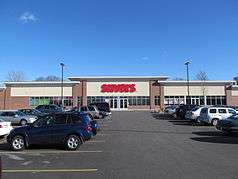Savers
|
| |
| Private | |
| Industry | Retail |
| Founded | 1954 (San Francisco, California, U.S.) |
| Headquarters | Bellevue, Washington, United States |
| Products | Second hand clothing, footwear, bedding, furniture, jewelry, electronics, toys, and housewares. |
| Website | http://www.savers.com |

Savers, Inc. headquartered in Bellevue, Washington, USA, is a privately held for-profit thrift store chain offering second hand shopping. An international company, Savers has more than 315 locations throughout the United States, Canada and Australia, and receives its merchandise by paying money to non-profit organizations for donated clothing and household items, and through direct donation by individuals. Savers is known as Value Village in the Pacific Northwest of the United States and most of Canada, and Village des Valeurs in Quebec. In Australia and other regions of the United States, the stores share the corporation's name.
Berkshire Partners bought a 50% stake in the company in 2000.[1] Freeman Spogli & Co. became the majority owner in 2006.[2] Leonard Green & Partners and TPG Capital bought out Freeman's shares in 2012.[3]
Business
The Savers' business model involves partnership with local non-profits and purchasing and reselling donated items. The non-profits collect and deliver donated goods to Savers, which pays them for the items at a bulk rate regardless of whether they ever make it to the sales floor. Savers has more than 160 non-profit partners throughout the United States, Canada and Australia, which it pays more than $117 million annually. As of 2012, the company had 315 stores worldwide and reached $1 billion in revenue. [4]
Items deemed resellable are displayed for purchase in stores. Savers also has a recycling program and attempts to recycle any reusable items that cannot be sold at the stores, as well as any items that do not sell over a period of time to make room for fresh merchandise. Savers has buyers for its recyclables throughout the world and attempts to keep as much donated product out of the waste stream as possible.
Business Operation Issues and Transparency
In the United States and Canada the business model for many non profits was that the organization would call homes for donations, and a truck would pick them up. By the early 2000s many organizations, like the Association of Community Living, partnered with Value Village because they believed it was too expensive to do the pickups and resell to used goods merchants. Many of the contracts these organizations signed with Value village provides a very small return compared to the (perceived) large amounts of money Value Village/Savers retains. According to an article that appeared in the Alberta Report in 1996 "According to the Times, for every $1.00 that went to undersigned charities from some Ellison-owned thrift stores, $2.55 went to the Ellison associates".
Controversy
On May 21, 2015, the Minnesota Attorney General filed suit[5] claiming that the corporation was misleading the public. The Attorney General pointed out, for example, that Savers pays only a very small percentage to the non-profit charities which partner with Savers (and for items other than clothing, nothing). Additionally, the Attorney General filed suit[6] against charities that partnered with Savers, for failing to monitor Savers for compliance with their partnership contract.
References
- ↑ Investor buys Value Village stake
- ↑ Freeman Spogli Spends $550 Million on Savers
- ↑ Freeman Passes Savers Inc. On to TPG, Leonard Green in $1.6B-Plus Deal
- ↑ "Thrift store wars heat up with new players in St. Louis market," St. Louis Post-Dispatch, February 9, 2013.
- ↑ http://www.ag.state.mn.us/Office/PressRelease/20150521SaversLawsuit.asp
- ↑ http://www.mprnews.org/story/2015/06/08/savers-lawsuit
External links
- Savers US Web site
- Savers Australia Web site
- Value Village's Web site
- Village des Valeurs's Web site